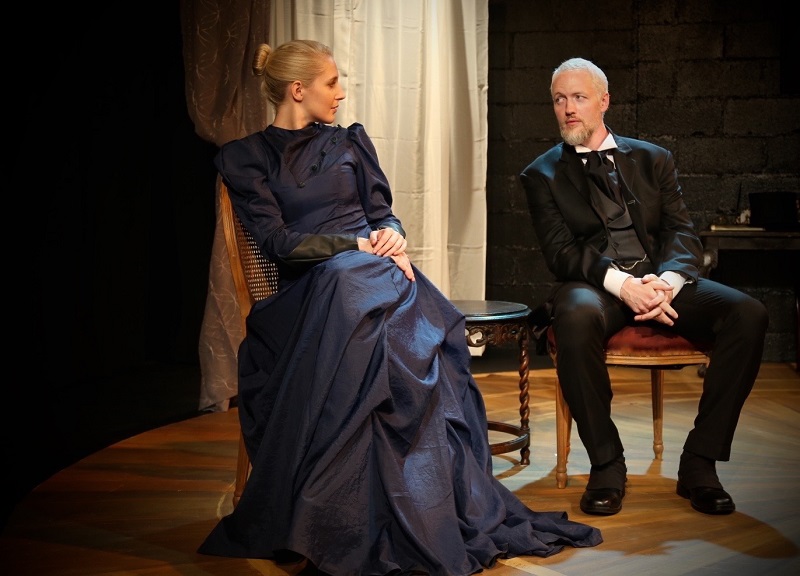
Henrik Ibsen's dramatic critique of bourgeois domesticity, Hedda Gabler, which premiered in 1891, remains probably his most often revived work. Hedda is still going strong 125 years later, now reincarnated in a fleet, fluid refresh written by Matt Minnicino and directed by Joseph Mitchell Parks, who played Lucius in 2015's inventive and memorable Titus Andronicus for the New York Shakespeare Exchange. In a play in which the name that someone is called signals ownership (or independence) and degrees of intimacy, Minnicino has rendered the protagonist's unmarried, titular name a parenthetical: Hedda (Gabler). When the play begins, Hedda (Valerie Redd) is more properly known (propriety being another of the play's thematic touchstones) as Hedda Tesman, having married ernest historian George Tesman (Kyle Schaefer), a "paragon of acceptability." George's rival, professional and otherwise, is Eilert Lovborg (Quinn Franzen), who is the Romantic genius to George's meticulous collator, including in his inclination towards alchoholism (a word no one in the play ever speaks). Hedda also has a rival, in Thea Elvsted (Susanna Stahlmann), the former, in this production, icily blonde and the latter a brunette with, in Hedda's words, wounded doe eyes who has helped Eilert conquer his demons and publish an acclaimed history of the world. During this process, Eilert and Thea have become "companions" under her husband's roof, much in defiance of social mores. While Thea actually has the courage and conviction to forge her own path in despite of propriety and patriarchy, Hedda, with a bit of a Madame Bovary complex, longs for the sublime, describing her desire to, just once, pull the strings of another person's fate. To this end, Hedda tries to meddle in Eilert's new work and new self, and ends up caught in a trap that is partly social and partly of her own making.
Hedda's father, General Gabler, overlooks these proceedings from his portrait on the rear wall of the stage, a patriarch in paint. (In an effective choice, the actors treat the opposite direction, the audience seating, as a literal fourth wall.) The play opens with a striking tableau that metamorphoses into a dance, in which the characters change places but repeat the same motions. Choreographed by Brad Landers, these interludes of impressionistic movement recur several times, to increasingly cacophonous music. The language creates similar patterns: the sentiment that people "just don't do" certain things returns several times as well, first about the placement of a hat, and last regarding the placement of a gun barrel. Hedda (Gabler) is also a play where people are often left searching for le mot juste or fall back on sayings to express themselves. And, even in this new version, which is a trifle less Victorian about some things, characters remain coy about some of the most important topics, such as Lovborg's alcoholism or Hedda's pregnancy, avoiding naming them directly. Perhaps this refusal to specify had some influence on the few small changes to the ending, which introduce a provocative ambiguity reminiscent of the door that closes A Doll's House.
The performances achieve an energetic naturalism, and this Hedda is very funny, almost surprisingly so, especially in the early going, before the darker undercurrents become more prominent. Kyle Schaefer and Kathleen March as George and his aunt Julia set the tone as they play wonderfully off one another, with George genial and a bit obtuse but sympathetic throughout and Julia suggesting much more than she ever says outright, her frazzled self-deprecation a mask for her deeper understanding of the Tesman household and its occupants. Redd's Hedda is less imperious and more grounded than some incarnations, while still suitably disdainful; but she also shows humanizing flashes of vulnerability. Franzen does excellent work with Eilert as he is caught between the worlds of Hedda and Thea, while Stahlmann succeeds in making Thea a compelling individual in her own right at the same time that she is a kind of mirror of Hedda, and Terence MacSweeny inhabits Judge Brack as a dapper, charming, and elegant predator. If you are already a fan of Hedda Gabler, then you owe it to yourself to see Hedda (Gabler); or if it's your first time with the Norwegian classic, then you can't go wrong with this as your introduction. - Leah Richards & John Ziegler
